
“We are soldiers in a mutant army and we’ll win the war!… Enough of this ‘light’ shit! Enough of colognes, car commercials, mineral water! We don’t want to look good or smell nice!”
Director: Álex de la Iglesia
Starring: Antonio Resines, Frederique Feder, Álex Angulo, Fernando Guellen, Karra Elejalde, Saturnino Garcia, Juan Viadas, Ion Gavella, Alfonso Martinez, Enrique San Francisco, Jaime Blanch
Screenplay: Jorge Guerriaechevarria and Alex de la Iglesia
Synopsis: In a dystopian future Spain, the terrorist group Mutant Action attempts the kidnapping of a famous bodybuilder, slipping a plastic bag over their victim’s head. While the terrorists are arguing over whether the bag should have holes in it, their victim dies… The JQK-TV crime reporter (Jaime Blanch) gives an overview of the ten-year history of Mutant Action, a group of disabled militants who wage war against the rich, the beautiful and the healthy. The reporter suggests that the kidnap attempt was linked to the imminent release from jail of Mutant Action’s leader, Ramón Yarritu (Antonio Resines), who has half his face missing. The members of Mutant Action, all dressed in evening clothes, collect Ramón when his sentence ends. Returning to the group’s decrepit spaceship headquarters, Ramón finds everything in a state of disrepair. Glancing at a large, incomplete artificial cake, Ramón orders his subordinates to finish it while he goes to change his clothes. He also tells the group’s mechanic, José Óscar ‘Manitas’ Tellería (Karra Elejalde), who lives in a body brace, to feed “the cat”, a monstrous creature that lives beneath the floor of the spaceship. Ramón and his team take their cake to the colossal mansion where the wedding of wholewheat bread heiress Patricia Orujo (Frederique Feder) is being held. The robotic guards will only let two of the gang inside the compound. Conjoined twins Alex (Álex Angulo) and Juan (Juan Viadas) Abadis wheel the “cake” in. After a futile attempt to talk the rest of the gang inside, Ramón orders Amancio ‘M.A.’ González (Alfonso Martinez), an enormous deaf-mute, to dispose of the guards. The gang pushes the cake through the throng of guests. Ramón orders Alex and Juan to play a particular song at the moment that Patricia and her husband, Luis Maria de Ostolaza (Enrique San Francisco), are cutting the cake. This will be the signal for M.A. to douse the lights, and for José ‘Chepa’ Montero (Ion Gavella), who is concealed inside the cake, to seize Patricia. Unfortunately, when Alex and Juan approach the jukebox, they find they have no money. As the pair argue, Patricia and Luis plunge a knife into the cake… Mortally wounded, Chepa bursts from the cake and opens fire with a machine-gun, slaughtering most of the wedding guests; Luis is knocked out, and Patricia dragged out from cover and captured. Ramón sends M.A. to deal with the police, but he is shot dead. Chepa also dies, but the rest of the gang escapes. Orujo (Fernando Guellen), Patricia’s father, receives a video from Ramón, in which he is instructed to take the one hundred million ransom to the planet Axturias. Orujo swears vengeance. As the gang travels through space, César ‘Quimicefa’ Ravenstein (Saturnino Garcia), a legless man who moves on a floating disc, and who keeps explosives strapped to his body, turns on a news report of the kidnapping. The gang members are shocked to learn that Ramón has demanded one hundred million, not ten, as they were told. They confront Ramón, who scoffs at them for believing what they hear on TV. Sending the twins and Quimicefa to various parts of the ship to do maintenance, Ramón then dispatches Manitas by feeding him to “the cat”. When the others hear his screams and rush to the control room, they find Ramón trying to “rescue” his victim. As Manitas dies, Ramón turns to his remaining crew and announces solemnly that there is a traitor in their midst…
Comments: In the post-Franco era, there was an attempt by the new Spanish government to reinvigorate film-making and to support the development of “a true national cinema”. Unfortunately, as in often the case with such well-intentioned but misguided programs, the attendant guidelines stifled creativity, leading to the production of films of narrow and repetitive focus, of little interest to anyone in or out of Spain.
In such circumstances, rebels inevitably arise. In 1980s Spain, it was Pedro Almodóvar who led the push-back with a series of sexually provocative black comedies and dramas which were everything that Spanish cinema was not “supposed” to be, but which were embraced both locally and internationally. In 1986, Almodóvar and his brother, Agustin, formed the production company, El Deseo, which in turn offered support for the next generation of Spanish film-makers—amongst them Alejandro ‘Álex’ de la Iglesia.



While Pedro Almodóvar has since regularly championed de la Iglesia, at the outset it may have been his seemingly (although by no means necessarily) contradictory background that appealed: de la Iglesia was a philosophy graduate who worked as a comic-book artist before transitioning into film as a production designer. In 1991, he met Jorge Guerriaechevarria, who subsequently became his writing partner; the two collaborated on a short film, Mirindas Asesina, about a man undergoing a psychotic break, before conceiving the project that would become Acción Mutante.
If Almodóvar was intent upon breaking down boundaries with his films, with Acción Mutante Álex de la Iglesias seems to have been intent upon blowing them up. The film is simultaneously a blending of the kinds of genre films conspicuously not being made in Spain, in particular science fiction and action movies, and a satirical attack upon Spanish politics and the failures of the post-Franco regime that had promised so much and delivered so little.
The results, unsurprisingly, are messy, unbalanced and wildly uneven in tone, with moments of brilliance and others – more others, it must be said – that just make you cringe.
Nevertheless, it is very clear that Acción Mutante was a labour of love. Pre-production took almost two years, as de la Iglesia and Guerriaechevarria tried to work out how to realise their bizarre, dystopian vision on what was, despite the backing of the Almodóvars, a rather meagre budget. Visually, they succeeded brilliantly: the film plays out in three unique environments, Spanish high society of the future, the crumbling spaceship which is both hideout and transport for the gang, and the desert planet on which the ransom exchange is to take place.
Each of these is cleverly and believably rendered; in the case of the first two, hilariously so. The production and costume design, the makeup and cinematography are all ingenious; while we can only tip our hats to the efforts of the cast in what must have been a difficult and often uncomfortable shoot.

(Said cast, by the way, includes Almodóvar regulars Bibi Andersen and Rossy de Palma, who cameo in the wedding-scene.)
As with many first films, Acción Mutante abounds with allusions to other productions—some of them referenced with admiration, some of them held up for mockery. A Beyond Thunderdome-ish dystopia is preceded by a future-grunge sensibility more Dark Star than Blade Runner, and this in turn by a hilariously awful vision of rampant artificiality that seems simultaneously informed by Terry Gilliam’s Brazil, Brian Yuzna’s Society—and, oddly, the films of Pedro Almodóvar: “oddly”, because there is a sense that Álex de la Iglesia was guilty here of biting the hand that was feeding him, with some aspects of the early, “beautiful people” segments playing like a satire upon Almodóvar’s own stylised brand of film-making.
(In fact, de la Iglesia is on record as dreading his producer’s visit to his sets, although as it turned out Almodóvar was too much of an artist himself to interfere with anyone else’s vision.)
And there is a second clear indication of a philosophical divide between the director and his producer: in place of Almodóvar’s frequently feminised perspective, Acción Mutante dismisses women almost entirely; while the film’s treatment of its one significant female character is its most disappointing and objectionable aspect.
This attitude is present from the first moments of Acción Mutante, wherein we watch news reports of the botched kidnapping of Matias Pons, President of the Bodybuilding Federation, who is accidentally suffocated by his would-be abductors. Pons is at least dignified by being shown fighting for his life, though unavailingly; but the second victim, Pons’ female companion, lies dead on his heart-shaped waterbed, killed in passing before we ever get there. The cameras are happy to leer at her near-naked body, but her death is dismissed in and out of film; she remains anonymous collateral damage, her irrelevance underscored by the obscuring pillow lying across her face.


These images give way to a résumé of Mutant Action, a militant group with membership drawn from the ugly, the dispossessed and the disabled, who wage war against society’s elite, with targets ranging from fashion shows to health clubs to sperm banks. The newsreader presents archival footage of the gang in action and, in a moment guaranteed to warm the heart of any couch potato, we see the gunning down of a TV aerobics program, while Quimicefa swoops towards the camera on his flying platform, brandishing the group’s banner.
But, alas—this was ten years earlier; since the imprisoning of Mutant Action’s leader, Ramón Yarritu, on weapons’ charges, things have gone from bad to worse for the militants. The death of Matias Pons is only the last such incident in long series of embarrassing stuff-ups.
The same news report mentions Ramón’s imminent release from prison. Fortunately for the terrorists, it doesn’t occur to the police to wait outside Ramon’s prison for them, so they are able to collect him without hindrance. Nor do the forces of law and order look up from their nightly beatings of graffiti artists, the poor, the homeless and anyone else who gets within reach of their batons as the gang’s conspicuous van rolls by on its way to their “secret” hideout—which also happens to be a spaceship.
Back home, Ramon misses not a single beat, but immediately throws himself into plans to kidnap for ransom heiress Patricia Orujo, whose wedding to Luis Maria de Ostolaza is scheduled for that very evening.
The others’ attempts to think for themselves do not sit well with Ramón, who reminds them of the various consequences of those attempts—like the bomb which went off an hour after the targeted fashion-show had ended. As the rest offer muttered excuses, he pulls them sharply back into line, reminding them of their subordinate positions and their debt to himself—using, amusingly enough, exactly the same tactics as those employed by Spencer Tracy in Pat And Mike.
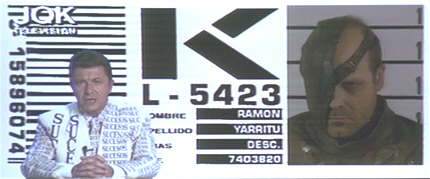

But despite Ramón’s sneering dismissal of his followers’ independent efforts, we are not altogether surprised when the planned kidnapping goes awry in spite of his leadership. For one thing, it is not until they have infiltrated the wedding by posing as the cake-caterers, Chepa hidden inside a huge, fake cake, that Ramón begins to impress his final orders upon his less-than-bright gang. One consequence of this is that Alex and Juan find themselves without the wherewithal to start the jukebox playing the song which is to act as the signal for Chepa to leap into action. He is therefore still crouching inside the cake when a giggling Patricia plunges a knife into it.
The twins do eventually find the necessary coin, however—meaning that when the mortally wounded Chepa lurches from the cake and begins an unplanned machine-gun massacre of the wedding-guests, the bloody mayhem plays out to the cheerful strains of “Aires de Fiesta”…
This wedding-scene scene is the highlight of Acción Mutante, balancing visual humour and on-the-mark satire with a scattering of clever details that help to flesh out the imagined future which forms its backdrop.
However, it also marks the disappointingly early point at which the film begins to drift off the rails.
The opening section of Acción Mutante offers an engaging blend of off-kilter comedy and shock scenes, winning the audience’s sympathy to the bungling would-be terrorists through the comic awfulness of their targets.
Yet that said, even these first scenes never play out quite as we might wish. I was very much struck, while watching this film, by how completely its premise – its seeming premise – could have been lifted from a John Waters movie. But of course, if this had been a John Waters movie, it would truly have been about the mutants: their banding together, their battle, and ultimately – can we doubt it? – their victory!

But instead, the gang’s litany of failure is followed by a lengthy sequence in which the other members are used, abused and disposed of by Ramón; and while it cannot be said that the life’s-a-bitch-and-then-you-die attitude of these unfolding scenes is out of place in this dystopian nightmare, it hardly fulfills the tacit promise of either the film’s title or its set-up.
In addition, with the shift to the kidnapping plot, the satire and black humour of Acción Mutante too often give way to straightfaced nastiness—particularly with regard to its handling of Patricia, who from this point is subjected to a barrage of almost non-stop abuse “justified” less by her position as the face of the enemy than by the deliberately annoying way her character is written.
It is significant that what has become this film’s signature has nothing to do with the members of Mutant Action, but is instead an image of a beaten and bloodied Patricia with her mouth stapled shut. There is very little satire about this aspect of the film: it is essentially played straight, and it is very, very ugly—with Patricia’s development of Stockholm Syndrome and her consequent embracing of Ramón’s cause – and of Ramón – tantamount to blaming the victim.
By the time the dust settles, two of the gang, M. A. as well as Chepa, are dead; but Patricia is in the hands of Ramón: she, her fiancé and her father having managed, remarkably, to survive the slaughter. Ramón, Quimicefa, Manitas and the twins escape the scene and retreat to their spaceship with their hostage.
Orujo and Luis receive a video in which Ramón issues his demands: namely, 100 million Ecus in used notes in an anti-fusion case, to be delivered at the Lost Mine Bar in Devil’s Valley on the planet Axturias. Ramón warns Orujo not to call the police, threatening Patricia’s rape and murder if he disobeys.
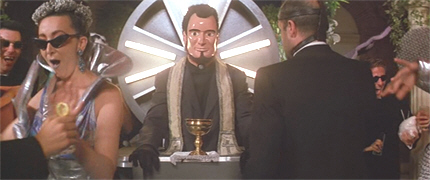

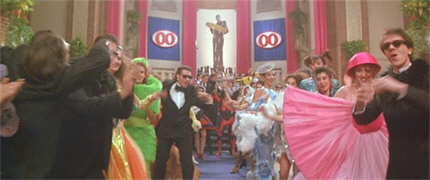

Meanwhile, Mutant Action’s rickety spaceship is crawling towards the rendezvous point, evading checkpoints under the guise of delivering frozen fish products. To pass the time, the gang members play cards and dream about what they will do once the 10 million Ecus are in their possession; at least until a dispute breaks out over whether the twins should receive one share or two—and Quimicefa one share or half of one.
Both game and argument are interrupted when Quimicefa turns on the television, revealing that the kidnapping is all over the news—and the actual size of the ransom demand.
Confronted with the discrepancy, Ramón accuses the authorities of trying to sow dissension amongst them, and the gang of disloyalty—and after all he has done and suffered for them, too… The others hastily deny any such thought, and respond enthusiastically when Ramón asks them his version of “the three questions”:
Ramón: “What were you when we met?”
Gang: “Garbage! Hospital refuge!”
Ramón: “Who made you what you are?”
Gang: “You, Ramón!”
Ramón: “And what are you?”
Gang: “Mutants! Mutants! Mutants!”
Ramón grins as they return enthusiastically to their tasks—which, as it turns out, separate them from one another. Ramón walks off with Manitas, evading his further questions by promting him to gang accountant. Mantias’ joy is short-lived, however – literally short-lived – as Ramón then takes him by the throat and feeds him, head first, to the cat.


Manitas’ screams reach the others. Ramón just has time to slip away before they converge in a futile attempt to retrieve their mangled colleague—and to “return”, joining in their doomed efforts at rescue. He then tells the others that this confirms his greatest fear: there is a traitor amongst them…
Bound to a chair, her mouth sealed and now drenched in Manitas’ blood, Patricia has been an eye- and ear-witness to all of this, and she makes a desperate if unavailing effort to alert the twins and Quimicefa to their danger—and does so again when Ramón, about to lay hands on Quimicefa, is almost caught in the act by the twins and hides behind part of the bulkhead. However, Alex misinterprets everything; finally taking her struggling and whimpering as a form of small-talk. He tries to make conversation with her, even apologising for the whole, you know, mass-slaughter-at-the-wedding thing; but also suggesting that she’s better off without Luis, who was clearly only interested in her money. He reassures her that she’ll find someone else; someone better; someone who will love her for herself.
Juan has been dozing peacefully on his brother’s shoulder. He awakes now and, covering his embarrassment, Alex puts on a front of anger, verbally attacking both Juan and Patricia before – after trying and failing to induce his brother to go away – leaving the room with him.
Ramón immediately springs back into action, joining Quimicefa in his laboratory and telling him that he has identified the traitor: himself, he adds, triggering the chest-bomb and taking away its pin.
The explosion jolts the ship and brings the twins running. They and Ramón force the door, but find only debris—electronic and otherwise. Ramón declares it suicide, and concludes that Quimicefa must have been the traitor—killing himself rather than be exposed. Patricia tries to intervene here, but her efforts win her only a smack in the face from Juan.


Ramón settles the twins’ remaining qualms by speaking of the ransom in terms of thirds, and then sends them off to get some sleep. Some time later, Alex is woken by a splash of blood in the face, and discovers that his brother is dead, a cleaver buried in his head and Ramón still standing over him. Confronted by Alex’s gun, Ramón explains hastily that he acted for Alex’s own good; that Juan was planning to kill him; that he was nothing but a burden; and that, besides, with his 5 million Ecus, Alex will be able to have the operation…
An unpersuaded Alex puts a bullet in Ramón’s leg—and one in his arm in response to an offer of half of the 100 million ransom. Honey not working, Ramón turns to vinegar, calling Alex a “genetic aberration” and “a moron”; pointing out he can’t fly the ship on his own; and that he is, as he always was, nothing without him, Ramón.
Just as the adversaries scramble back into the control-room, Patricia’s frantic efforts lead to the snapping of one of the chains that hold her. She hastily disguises her success, as Alex’s anger leads him to get too close to Ramón. The latter knocks the gun away and attacks with his fists, only for Alex to deliver a savage knee to the groin and then shove him into the bulkhead, stunning him.
As jets of leaking brake-fluid coat the control-room, Alex and Patricia scramble for possession of the gun—although face-to-face they pause, with Patricia giving Alex as big a smile as she can manage, through her staples. Unfortunately, this momentary hesitation gives Ramón the upper hand again: he seizes Alex, beating him into unconsciousness.
“100 million divided by one is 100 million,” Ramón concludes—so enamoured by thoughts of the success of his plan and his own brilliance, he fails to notice that the ship is out of control and plunging towards the nearest planet.


Instead, he gives an individualised version of the three questions – “What am I? The fucking chief!” – before realising that Patricia will have to be cleaned up before the ransom exchange. He starts by pulling out her staples—freeing her to shriek, “Shit!!” in the face of the ship’s imminent crash…
The explosion is observed from a following ship, which carries Orujo and his agent—the latter opining that he is 98% sure no-one could have survived. That’s not good enough for Orujo: they will carry on.
On Axturias, a battered Ramón staggers from the wreckage, dragging a near-unconscious Patricia with him. Nearby lie the bloody remains of the cat, which did not survive the crash. Having managed to salvage his map, Ramón tries to determine where they are and how to get to the ransom-drop; while the dazed Patricia’s attempt to make sense of everything results in a twisted version of events that positions Ramón as the hero of her story. She doesn’t understand why Ramón is tying her up. Gazing from her bound wrists to his face, she asks plaintively, “Will we have to kill my father?”
“Not the Stockholm Syndrome again,” sighs Ramón. “Not today.”
He concludes that they have five hours to reach the Lost Mine Bar. The two set out across the desert—Patricia being pulled along the ground by her hair.
But there is also a blood trail leading away from the ship—and the discarded cleaver. Nearby, Alex staggers up a hill, burdened by the literal dead weight of his brother. Others have noticed, though: even as he fights off the vultures that have come to pick at Juan, Alex comes under the attentions of an inquiring pair of hands…
Meanwhile, Orujo and his agent have landed on the planet—with the former determined to carry out his plan, even though it requires the transportation of some “unstable material” over rough terrain, and even if, “I take the world with me!”


We discover that Alex has been helped to a cavern within the barren mountains. One of the sidelines of Alex’s near-blind rescuer is taxidermy; and he does his best for his new friend by embalming Juan (“He looks like a doll!” complains Alex, which—um, yeah…); though he warns Alex too that there is still a risk of gangrene and that, “He will have to come off.” He also tells him about the dangerous Wild Miners, driven mad by the gases in the mines and living feral in the hills.
(We gather that, coal supplies having run out on Earth, humankind has taken to mining in space rather than trying alternative fuel sources…)
Alex, however, now focused on revenge, wants only directions to the Lost Mine Bar. His mutterings about Patricia have an electrifying effect upon his new friend, who explains in a panic that there are no women on Axturias—not any more. There used to be a few, purchased by syndicate; but you know how women are: delicate; not very sturdy…
Out of exhaustion rather than kindness, Ramón has given up dragging Patricia and set her on her feet; although this only feeds her new sense of social consciousness and empathy for the disadvantaged, an expression of which pours from her in an unending verbal stream. Ramón’s only response is a blow to the face, which leaves Patricia sprawled on the rocks below. He berates himself for this act of temper, urging himself not to ruin things at this late date, and scrambles down to collect her…as she apologises for provoking him.
Ramón fails to notice that the two of them are being watched from an overhanging ledge by someone making comparisons with the centrefold of a magazine… With Ramón’s back turned for a moment, the slight, masked, wildly giggling figure attacks Patricia. Ramón hauls him off but, without water for the journey across the desert, merely sets the newcomer on his feet and persuades him to take them to where he lives.
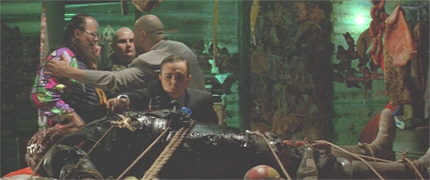
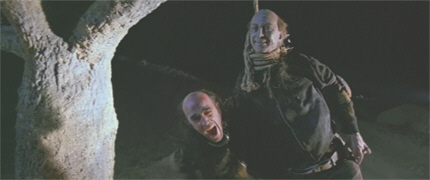
This proves to be a slight error of judgement, as he and Patricia find themselves the prisoners of an all-male clan of Wild Miners, the youngest only a child (at least in the sense that the kid in Burial Ground is a child)—who for the first time in their brutal sojourn on Axturias find themselves in the presence of a woman…
Uh, yyyyeah…. I’m not a big fan of rape jokes, actually (I know! – go figure); not even when the woman “wins”, which I imagine is supposed to excuse this one. Let’s just say that a lot of distasteful things happen here, but the upshot is that Patricia and Ramón escape from their captors in possession of a jeep and a map to the bar, at the price of one of Patricia’s few remaining garments.
I should mention that his sequence also involves Ramón getting tortured with a razor blade and table condiments. Now that’s funny!
Meanwhile, Alex and his visually-impaired friend have camped out for the night under the local hanging-tree. As you do. Alex ends up confiding his feelings – and feelings of inadequacy – about Patricia, and his friend reveals that he once had a woman, but—well, she wasn’t very sturdy…
The blind man is about to offer Alex a piece of advice culled from his extensive romantic experience, when instead he gets a hole blown through his body by another car-load of Wild Miners, who proceed to string up the twins from the hanging-tree—fortunately, with the rope around Juan’s neck.
Patricia and Ramón’s dash to the bar takes them straight past the tree. Patricia, driving, does not notice the frantically struggling Alex, but Ramón does: he smirks back over his shoulder as the jeep disappears into the night.


At the Lost Mine Bar, miners (Wild and otherwise) drink and fight and fire off their weapons; Orujo gets into the spirit of things by shooting dead a server who asks how his food was. Having explained the explosive device – “Once it’s set, nothing can stop it” – Orujo’s agent departs, after warning his employer about the range of the device. He also takes a moment to ask whether, by these means, Orujo can kill Ramón without hurting Patricia, but only gets snarled at in response.
As the agent leaves, Luis comes in—informing Orujo that “the TV guys” are outside; he admits laughingly that told them the rendezvous, but that he didn’t think they’d actually come. A furious Orujo orders him to get rid of them.
Back at the hanging-tree, Alex’s struggles finally result in the branch breaking. As he – and Juan – hit the ground, they are nearly run over by the first group of Wild Miners, who are on their way to the bar to recapture Patricia. They offer Alex a lift.
With the convergence of the characters upon the Lost Mine Bar, Acción Mutante finally regains much of the satirical tone of the early part of the film. Of particular importance here is the arrival upon the scene of the newsreader and his camera crew— the former promising his viewers that they will witness exclusively the end of, “The kidnapping of the year!”…after this word from our sponsor…and the latter dictating the tempo of the ransom negotiation, scuttling from one end of the bar to the other to ensure they have the best angle on the posturing and threats of Ramón and Orujo.
Luis then thrusts himself into the proceedings, grinning idiotically into the camera as he offers to deliver the case of ransom money to Ramón—and ending up at gunpoint when Patricia turns on him.
(“There appears to be a hitch,” deadpans the newsreader.)


When the dust settles, a cameraman is dead, Luis is nursing his crotch, and an infuriated Ramón has Patricia back on his hands—as well as a “ransom” consisting of old magazines and comics. With nothing left in his armoury but bluff, Ramón warns Orujo that “all his men” have their guns trained on him and that, if he doesn’t hand over the real money, he’ll never get out of there alive. Orujo immediately ups the stakes, announcing that no-one is getting out alive in any case; no-one.
At this point, it dawns upon a reflective Orujo that he might in fact be crazy…
But if so, he’s not the only one; and from here Acción Mutante escalates to a climax involving exchanges of automatic gunfire, missiles, gas bombs, explosions, severed limbs, hands-on murder and an astronomical body-count.
Oh—and a happy ending.
We mustn’t forget the happy ending…


I honestly can’t make up my mind if I want to see this one myself or not… At the beginning of the review it sounds absolutely perfect for my (somewhat dubious) tastes but the way it seems to go ugly and nasty as opposed to darkly funny really give me doubts. I suppose I could always watch until it gets to the mouth stapling and make up my mind then to go on or not. After all, I made it through Wake In Fright thanks to to your timestamp help on where to close my eyes and cover my ears!
I’ve still got to find Lake Mungo and watch it anyways – going by your review of that film A: I’m sure I’ll like it and B: I should probably watch it on a bright sunny afternoon and with company if I want to have any chance of a sound sleep later. It really seems like the sort of film that will leave me worrying over every flicker in my peripheral vision and every knock or creak in the house.
LikeLike
It only shows the unstapling, if that helps?? (Yeah, not really.) Yes, for me it runs off the rails quite early but it is absolutely an example of YMMV.
Alone and with the lights out, you coward! 😀
LikeLike
One of my favorite movies!
LikeLike